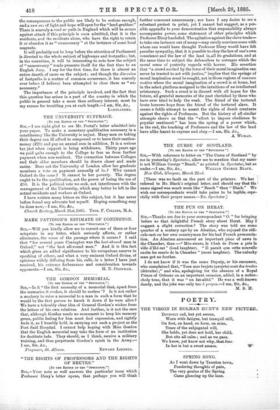"THE RIGHTS OF PROFESSORS AND THE RIGHTS OF BRUTES."
ITo THE EDITOR OF THE "13PECTATOR."1
So„—Your note so well answers the particular issue which Professor Dicey's letter opens, that perhaps you will think
further comment unnecessary ; nor have I any desire to see a reluctant protest in print, yet I cannot but suggest, as a possible appendix to your demonstration that responsibility always accompanies power, some statement of other principles which Professor Dicey hasdefied. The agitation against the slave-tradeto take one instance out of many—may surely convince some with whom one would have thought Professor Dicey would have felt peculiar sympathy, that it is possible to obey the law of one's own conscience and the law of the land in,all its gradations, and at the same time to subject the defenceless to outrages which the moral sense of posterity regards with horror. His assertion that "a crowd excited by the force of their moral imagination can never be trusted to act with justice," implies that the springs of moral inspiration must be sought, not in those regions of common motive where the moral imagination of a crowd is at home, but in the select platform assigned to the intuitions of an intellectual aristocracy. Such a creed is in discord with all hopes for the future, all grateful memories of the past cherished by those who have ever tried to help the weak. The friend of the tortured brute borrows hope from the friend of the tortured slave. It seems a futile attempt to assert the rights of dumb creatures against the rights of Professors. But the history of all similar attempts shows us that the "effort to impose obedience to. popular sentiment" has been the spring of a power which,. in the end, the teaching of Professors and the law of the land have alike learnt to express and obey.—I am, Sir, &c.,
A Womex.


































 Previous page
Previous page